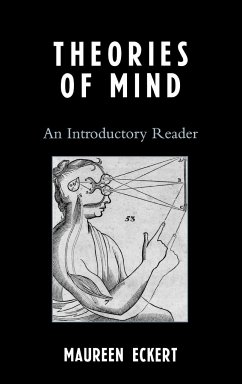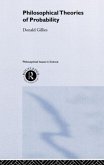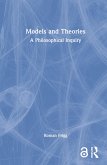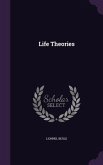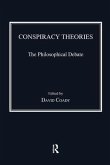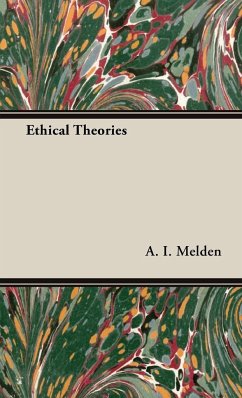Theories of Mind
An Introductory Reader
Herausgeber: Eckert, Maureen
Theories of Mind
An Introductory Reader
Herausgeber: Eckert, Maureen
- Gebundenes Buch
- Merkliste
- Auf die Merkliste
- Bewerten Bewerten
- Teilen
- Produkt teilen
- Produkterinnerung
- Produkterinnerung
Intended for introductory classes focusing on philosophy of mind, Theories of Mind includes readings from primary sources, edited to suit the needs of the beginner. Edited selections focus on vivid examples and counter-examples, and meet the needs of instructors concerned with assigning accessible primary source material that can serve as a foundation for more advanced studies in philosophy.
Andere Kunden interessierten sich auch für
![Taking Conspiracy Theories Seriously Taking Conspiracy Theories Seriously]() Taking Conspiracy Theories Seriously150,99 €
Taking Conspiracy Theories Seriously150,99 €![Philosophical Theories of Probability Philosophical Theories of Probability]() Donald GilliesPhilosophical Theories of Probability190,99 €
Donald GilliesPhilosophical Theories of Probability190,99 €![Models and Theories Models and Theories]() Roman FriggModels and Theories181,99 €
Roman FriggModels and Theories181,99 €![Life Theories Life Theories]() Lionnel BeäleLife Theories29,99 €
Lionnel BeäleLife Theories29,99 €![Conspiracy Theories Conspiracy Theories]() Conspiracy Theories199,99 €
Conspiracy Theories199,99 €![3 Theories of Everything Deluxe Version 3 Theories of Everything Deluxe Version]() Ellis Potter3 Theories of Everything Deluxe Version18,99 €
Ellis Potter3 Theories of Everything Deluxe Version18,99 €![Ethical Theories Ethical Theories]() A. I. MeldenEthical Theories41,99 €
A. I. MeldenEthical Theories41,99 €-
-
-
Intended for introductory classes focusing on philosophy of mind, Theories of Mind includes readings from primary sources, edited to suit the needs of the beginner. Edited selections focus on vivid examples and counter-examples, and meet the needs of instructors concerned with assigning accessible primary source material that can serve as a foundation for more advanced studies in philosophy.
Hinweis: Dieser Artikel kann nur an eine deutsche Lieferadresse ausgeliefert werden.
Hinweis: Dieser Artikel kann nur an eine deutsche Lieferadresse ausgeliefert werden.
Produktdetails
- Produktdetails
- Verlag: Rowman & Littlefield Publishers
- Seitenzahl: 284
- Erscheinungstermin: 11. August 2006
- Englisch
- Abmessung: 235mm x 157mm x 21mm
- Gewicht: 615g
- ISBN-13: 9780742550629
- ISBN-10: 0742550621
- Artikelnr.: 22332487
- Herstellerkennzeichnung
- Libri GmbH
- Europaallee 1
- 36244 Bad Hersfeld
- gpsr@libri.de
- Verlag: Rowman & Littlefield Publishers
- Seitenzahl: 284
- Erscheinungstermin: 11. August 2006
- Englisch
- Abmessung: 235mm x 157mm x 21mm
- Gewicht: 615g
- ISBN-13: 9780742550629
- ISBN-10: 0742550621
- Artikelnr.: 22332487
- Herstellerkennzeichnung
- Libri GmbH
- Europaallee 1
- 36244 Bad Hersfeld
- gpsr@libri.de
Maureen Eckert is assistant professor of philosophy at the University of Massachusetts, Dartmouth. She is co-editor of Philosophical Horizons: Introductory Readings and Knowledge and Reality: Classic and Contemporary Readings
Part 1 Introduction Part 2 Section 1: Substance Dualism and Gilbert Ryle's Critique Chapter 3 Descartes
Principles of Philosophy
selections Chapter 4 Gilbert Ryle
Concept of Mind
selection from chapter 1 and selection from chapter 2 Chapter 5 Jerry Fodor
"Logical Behaviorism" selection from Language of Thought Part 6 Section 2: Three Theories of Mind Part 7 Type Identity Chapter 8 J.J.C. Smart
"Sensations and Brain Processes
" selection Part 9 Functionalism Chapter 10 Alan Turing
"Computing Machinery and Intelligence
" selection Chapter 11 David Lewis
"Psychophysical and Theoretical Identifications
" selection Chapter 12 Jerry A. Fodor
"The Mind-Body Problem" Chapter 13 Ned Block
"Troubles with Functionalism
" selection Chapter 14 Frank Jackson
"Epiphenomenal Quailia" Part 15 Eliminative Materialism Chapter 16 Paul Churchland
"Eliminativism" from Matter and Consciousness Chapter 17 Daniel C. Dennett
selection from "True Believers: The Intentional Strategy and Why it Works" Chapter 18 Andy Clark
"I am John's Brain" Part 19 Section 3: Artificial Intelligence Chapter 20 John Searle
"Is the Mind's Brain a Computer Program?" Chapter 21 Paul and Patricia Churchland
"Could a Machine Think?" 22 Daniel C. Dennett: "On the Practical Requirements of Making a Conscious Robot" Part 23 Section 4: Consciousness Part 24 Subjectivity/Objectivity Chapter 25 Thomas Nagel
"What is it Like to Be a Bat?" Chapter 26 Keith Gunderson
"Asymmetries and Mind-Body Perplexities
" selection Chapter 27 David Lewis
"On Knowing What it's Like" Part 28 Theories of Consciousness Chapter 29 David Armstrong
"What is Consciousness?" Chapter 30 David Chalmers
"Facing Up to the Problem of Consciousness" Chapter 31 Barbara Montero
"Rethinking the Mind-Body Problem"
Principles of Philosophy
selections Chapter 4 Gilbert Ryle
Concept of Mind
selection from chapter 1 and selection from chapter 2 Chapter 5 Jerry Fodor
"Logical Behaviorism" selection from Language of Thought Part 6 Section 2: Three Theories of Mind Part 7 Type Identity Chapter 8 J.J.C. Smart
"Sensations and Brain Processes
" selection Part 9 Functionalism Chapter 10 Alan Turing
"Computing Machinery and Intelligence
" selection Chapter 11 David Lewis
"Psychophysical and Theoretical Identifications
" selection Chapter 12 Jerry A. Fodor
"The Mind-Body Problem" Chapter 13 Ned Block
"Troubles with Functionalism
" selection Chapter 14 Frank Jackson
"Epiphenomenal Quailia" Part 15 Eliminative Materialism Chapter 16 Paul Churchland
"Eliminativism" from Matter and Consciousness Chapter 17 Daniel C. Dennett
selection from "True Believers: The Intentional Strategy and Why it Works" Chapter 18 Andy Clark
"I am John's Brain" Part 19 Section 3: Artificial Intelligence Chapter 20 John Searle
"Is the Mind's Brain a Computer Program?" Chapter 21 Paul and Patricia Churchland
"Could a Machine Think?" 22 Daniel C. Dennett: "On the Practical Requirements of Making a Conscious Robot" Part 23 Section 4: Consciousness Part 24 Subjectivity/Objectivity Chapter 25 Thomas Nagel
"What is it Like to Be a Bat?" Chapter 26 Keith Gunderson
"Asymmetries and Mind-Body Perplexities
" selection Chapter 27 David Lewis
"On Knowing What it's Like" Part 28 Theories of Consciousness Chapter 29 David Armstrong
"What is Consciousness?" Chapter 30 David Chalmers
"Facing Up to the Problem of Consciousness" Chapter 31 Barbara Montero
"Rethinking the Mind-Body Problem"
Part 1 Introduction Part 2 Section 1: Substance Dualism and Gilbert Ryle's Critique Chapter 3 Descartes
Principles of Philosophy
selections Chapter 4 Gilbert Ryle
Concept of Mind
selection from chapter 1 and selection from chapter 2 Chapter 5 Jerry Fodor
"Logical Behaviorism" selection from Language of Thought Part 6 Section 2: Three Theories of Mind Part 7 Type Identity Chapter 8 J.J.C. Smart
"Sensations and Brain Processes
" selection Part 9 Functionalism Chapter 10 Alan Turing
"Computing Machinery and Intelligence
" selection Chapter 11 David Lewis
"Psychophysical and Theoretical Identifications
" selection Chapter 12 Jerry A. Fodor
"The Mind-Body Problem" Chapter 13 Ned Block
"Troubles with Functionalism
" selection Chapter 14 Frank Jackson
"Epiphenomenal Quailia" Part 15 Eliminative Materialism Chapter 16 Paul Churchland
"Eliminativism" from Matter and Consciousness Chapter 17 Daniel C. Dennett
selection from "True Believers: The Intentional Strategy and Why it Works" Chapter 18 Andy Clark
"I am John's Brain" Part 19 Section 3: Artificial Intelligence Chapter 20 John Searle
"Is the Mind's Brain a Computer Program?" Chapter 21 Paul and Patricia Churchland
"Could a Machine Think?" 22 Daniel C. Dennett: "On the Practical Requirements of Making a Conscious Robot" Part 23 Section 4: Consciousness Part 24 Subjectivity/Objectivity Chapter 25 Thomas Nagel
"What is it Like to Be a Bat?" Chapter 26 Keith Gunderson
"Asymmetries and Mind-Body Perplexities
" selection Chapter 27 David Lewis
"On Knowing What it's Like" Part 28 Theories of Consciousness Chapter 29 David Armstrong
"What is Consciousness?" Chapter 30 David Chalmers
"Facing Up to the Problem of Consciousness" Chapter 31 Barbara Montero
"Rethinking the Mind-Body Problem"
Principles of Philosophy
selections Chapter 4 Gilbert Ryle
Concept of Mind
selection from chapter 1 and selection from chapter 2 Chapter 5 Jerry Fodor
"Logical Behaviorism" selection from Language of Thought Part 6 Section 2: Three Theories of Mind Part 7 Type Identity Chapter 8 J.J.C. Smart
"Sensations and Brain Processes
" selection Part 9 Functionalism Chapter 10 Alan Turing
"Computing Machinery and Intelligence
" selection Chapter 11 David Lewis
"Psychophysical and Theoretical Identifications
" selection Chapter 12 Jerry A. Fodor
"The Mind-Body Problem" Chapter 13 Ned Block
"Troubles with Functionalism
" selection Chapter 14 Frank Jackson
"Epiphenomenal Quailia" Part 15 Eliminative Materialism Chapter 16 Paul Churchland
"Eliminativism" from Matter and Consciousness Chapter 17 Daniel C. Dennett
selection from "True Believers: The Intentional Strategy and Why it Works" Chapter 18 Andy Clark
"I am John's Brain" Part 19 Section 3: Artificial Intelligence Chapter 20 John Searle
"Is the Mind's Brain a Computer Program?" Chapter 21 Paul and Patricia Churchland
"Could a Machine Think?" 22 Daniel C. Dennett: "On the Practical Requirements of Making a Conscious Robot" Part 23 Section 4: Consciousness Part 24 Subjectivity/Objectivity Chapter 25 Thomas Nagel
"What is it Like to Be a Bat?" Chapter 26 Keith Gunderson
"Asymmetries and Mind-Body Perplexities
" selection Chapter 27 David Lewis
"On Knowing What it's Like" Part 28 Theories of Consciousness Chapter 29 David Armstrong
"What is Consciousness?" Chapter 30 David Chalmers
"Facing Up to the Problem of Consciousness" Chapter 31 Barbara Montero
"Rethinking the Mind-Body Problem"

